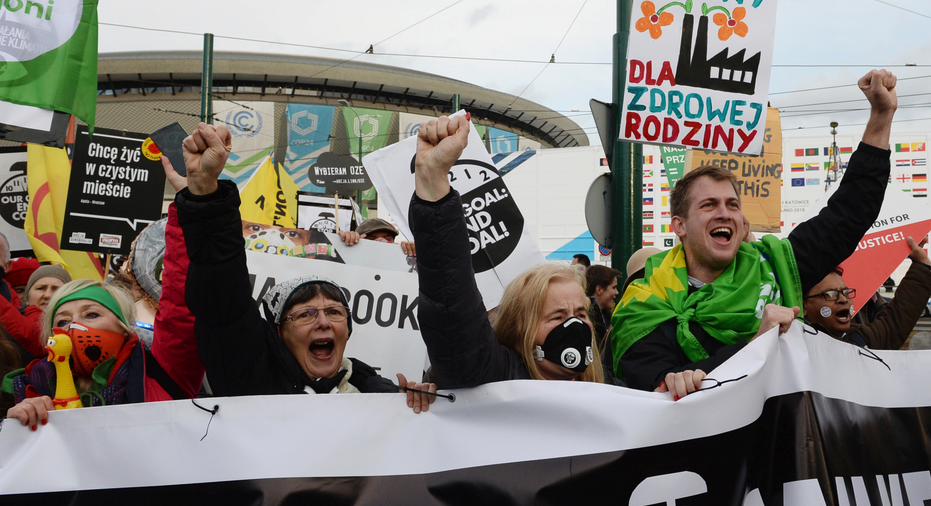Protesters march as UN climate talks hit fossil fuel snag
A climate activists with a colorful mask attends the March for Climate in a protest against global warming in Katowice, Poland, Saturday, Dec. 8, 2018, as the COP24 UN Climate Change Conference takes place in the city. (AP Photo/Alik Keplicz)
KATOWICE, Poland – Thousands of people from around the world marched Saturday through the southern Polish city that's hosting this year's U.N. climate talks, demanding that their governments take tougher action to curb global warming.
Protesters included farmers from Latin America, environmentalists from Asia, students from the United States and families from Europe, many of whom said climate change is already affecting their lives.
"Climate change is the thing that frightens me the most," said Michal Dabrowski from Warsaw, who brought his young daughter to the march. "I'm a father and it's kind of crucial that she will have a decent life."
Marchers gathered in one of Katowice's main squares before setting off for the conference center where delegates from almost 200 countries are haggling over the fine print of the 2015 Paris accord to fight climate change.
Some protesters were dressed as endangered orangutans while others wore breathing masks to highlight the air pollution in Katowice, which lies at the heart of Poland's coal mining region of Silesia.
A group wearing polar bear costumes was expelled from the march after suggesting that fossil fuels should be replaced by nuclear power, a technology that many environmentalists object to.
Chanting "Wake up! It's time to save our home!" and holding banners including one reading "Make the planet great again," protesters marched through Katowice accompanied by a heavy police presence that included officers on horseback.
The "March for Climate" passed largely peacefully, though three people were detained after a small scuffle with police, a Katowice police spokeswoman said.
Earlier Saturday, environmental groups had complained that some of their activists were being turned back at the Polish border or deported. One Belgian activist was allowed to enter the country after her country's ambassador intervened with Polish authorities.
Poland has introduced temporary random identity checks ahead of the U.N. climate conference, arguing they were needed for security.
Inside the U.N. meeting, negotiators were concluding the first week of talks, which are focused on finalizing the Paris rulebook that determines how signatories to the 2015 deal record and report their greenhouse gas emissions.
In a recent report, the Intergovernmental Panel on Climate Change said drastic action would be needed to achieve the Paris accord's most ambitious target of keeping global warming below 1.5 degrees Celsius (2.7 degrees Fahrenheit).
Illustrating the sensitivity of this message for some governments, major oil exporting countries including Saudi Arabia and Russia objected to "welcoming" the IPCC's report. The issue is now one of several that will be left to government ministers, who begin arriving in Katowice on Monday to try to break remaining deadlocks.
Environmental groups want countries to send a strong signal that they're ready for more ambitious action in the years ahead, but some protesters Saturday felt that governments alone would not do enough to fight climate change.
"I've had enough of just sitting and looking at politicians deciding things for us. It's time for us to tell them what we want and to start a grassroots revolution," said Anna Zalikowska.
Similar marches for the environment took place in France on Saturday, but those were overshadowed by a larger "yellow vest" protest in Paris staged by people angry over fuel tax increases.
The tax rise, now put on hold, was aimed at encouraging drivers to reduce their use of fossil fuels, a measure experts say is necessary to nudge consumers toward cleaner alternatives.
Resistance to the fuel tax is a blow to French President Emmanuel Macron, who sees himself as the guarantor of the Paris accord.
U.S. President Donald Trump, who has announced he's pulling the United States out of the agreement, claimed Saturday that "people do not want to pay large sums of money ... in order to maybe protect the environment."
Economists say the price of curbing climate change is actually far lower than the eventual cost of coping with the catastrophic famines, storms and sea level rises that will happen with a warming climate.
The Climate Action Network, an umbrella group for environmental organizations, on Saturday gave its Fossil of the Day award to the United States after Washington's diplomats objected to linking human rights to climate change.
___
Follow Frank Jordans on Twitter at http://www.twitter.com/wirereporter
___
Read more stories on climate issues by The Associated Press at https://www.apnews.com/Climate





















